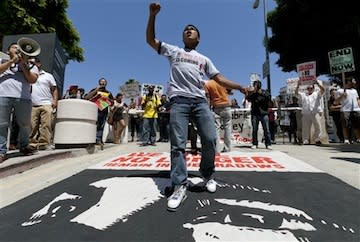 The Lookout
The LookoutLawyers warn illegal immigrants against turning themselves in on false amnesty rumors

Lawyers are warning illegal immigrants not to turn themselves in to the federal government in the hopes of benefiting from the Obama administration's plan to dismiss certain deportation cases.
"We were getting a lot of reports of people thinking that a new amnesty had just been declared," Crystal Williams, the president of the American Immigration Lawyers Association, said in an interview with The Lookout. "We want to make clear to people that there is no amnesty."
The group released a fact sheet explaining the Obama administration promise to review 300,000 pending deportation case. The administration says it will dismiss cases against "low priority" illegal immigrants who have not committed crimes.
Low priority illegal immigrants are defined as veterans or spouses of veterans, pregnant women, the victims of crimes, the ill or elderly, and people who were brought to the country as young children. People whose cases are dismissed may apply for a permit to work legally in the country, prompting rumors that the program amounted to "amnesty" for entire categories of people.
Williams says it is unclear who would qualify for the work permit, and having the permit does not give an immigrant legal resident status, as a green card would.
The new rules apply only to people who are already in deportation proceedings, the fact sheet warns.
Arizona Gov. Jan Brewer, who is in a court battle with the federal government over the state's illegal immigration law, criticized the new policy as "backdoor amnesty," a characterization that Williams says increases misinformation among immigration communities. "Every time something happens that gets called an amnesty by political opponents or in the press, that's when people are just ripe for a mark like this," Williams says.
Cecilia Munoz, the White House director of intergovernmental affairs, told the Univision anchor Jorge Ramos that no group of people are now considered beyond deportation.
"We're not saying there are categories of people we won't deport," Munoz said, adding that any decisions to stop deportations would be made on a case-by-case basis. She said that instances of people who are apprehended at the border or who have been deported previously and try to return would still be considered high-priority deportations.
But confusion persists.
Luis Gutierrez, a Democratic representative from Illinois and a vocal critic of Obama's failure to pass immigration reform through Congress, told Ramos that he thinks the new regulation makes young people who were brought into the country as children effectively "un-deportable." Gutierrez said he plans to hold town halls to explain the new rules to constituents.
Meanwhile, CNN.com columnist Ruben Navarrette said the Obama administration has offered "false hope to the desperate" with the small changes, which he says would apply to very few people.